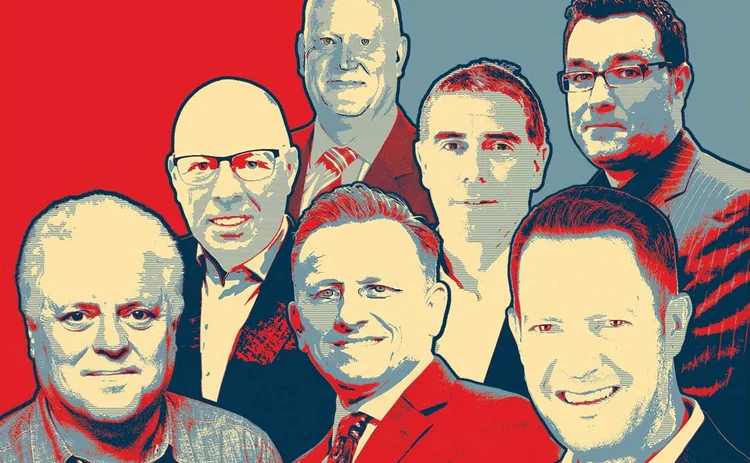
Profile: On the acquisition trail

With consolidation firmly on the agenda in the broking sector, Ida Axling talks to seven experts in the industry on the opportunities and perils
A new wave of consolidation is undoubtedly sweeping across the broking sector with deals frequently being completed and a fresh set of players with buying on the agenda.
Arguably it is the fourth wave the sector has seen. First in the 1980s and 1990s were the international players, then the likes of Towergate, Bluefin, Oval, Jelf and Giles formed the second. The third and most recent was the consolidation of the consolidators.
Diving in to take a closer look at the current climate and the challenges and opportunities that come with making acquisitions, Insurance Age has brought together seven experts whose businesses are actively looking to buy other brokers.
According to the brokers the market for buying firms is currently buoyant, with plenty of owners looking to exit their businesses.
“There has always been consolidation in the market and people wanting to sell,” says Mike Bruce, chief executive, retail, at Global Risk Partners.
Some of the reasons given for wanting to sell include succession planning, brokers struggling to grow their business, regulation becoming too much of a burden and consolidation of insurers becoming a problem.
In addition, our specialists highlight that smaller firms can gain a lot from being part of a bigger company, including investment, better service from insurers and help coping with heavy regulation.
Most of the panel state that in order to gain competitive advantage in the marketplace they only want to buy specialist and niche brokers; however they note that what the vendor is actually specialised in is less important as long as it has some type of niche focus.
Several of the prospective buyers claim that there are no more brokers up for sale now than there have been previously.
“There are 3,500 brokers in the UK and probably five to ten percent of them think about selling every year, that has not fundamentally changed,” observes Brendan McManus, CEO at PIB Insurance Brokers. “With most of the businesses we’ve bought we have identified that we would like to buy them, and then done it, rather than them being for sale in the first place.”
Are there a lot of brokers competing over the same targets?
“There seems to be lots of competition currently definitely more than 12 months ago. There are a lot of people who have started buying other businesses for the first time – the vendors have choices but they must ask themselves if the potential purchaser has the resources and infrastructure to integrate their business and of course provide the ongoing support required.”
Dave Clapp, The County Group
“With our model there’s not a lot of competition. We are unique in our understanding of independent brokers and the support services we provide for them. Our structure is that they keep their own leadership teams in place and that they continue to focus on their customers.”
Andy Fairchild, Broker Network
“The markets we’re looking at are so varied – from small to large potential purchases – that we’re not coming up against the same people. The PIBs and GRPs of the world may well be treading on each other’s toes because they’re all after the smaller commercial brokers to add to their bigger networks.”
Ian Donaldson, Autonet
“Yes, there are other firms competing, but we don’t target every single business in the UK and neither do other brokers. If you’re looking at a small broker the competition could be another local broker, but if you’re looking at a larger broker that has engaged advisors there’ll be a different community of people being interested.”
Mike Bruce, Global Risk Partners
“In some cases, but in a lot of cases we’ve originated the deal ourselves and there’s no competition – it’s about finding a meeting of minds between PIB and the vendor.”
Brendan McManus, PIB Insurance Brokers
“There’s not as many targeting the same small brokers. There are more buyers but in the scheme of things the supply and demand for the small brokers is more balanced.”
Howard Lickens, Clear
“There’s always competition,
but the deals we’ve made that have been successful are where there has been a good cultural fit. If we click the deal works regardless of the competition from other brokers.”
Peter Blanc, Aston Scott
Stats
Together these brokers have made 31 deals in the last year
In total, during their individual careers, these brokers have made more than 138 deals
Too much consolidation?
Most of the other experts also dismiss the fear that there could be too much consolidation in the market, highlighting instead that there are still lots of brokers out there and that mergers and acquisitions are just part of “business as usual”.
However, Clear Insurance CEO Howard Lickens expresses concern that the insurance sector is being hollowed out in the middle and states that any broker that achieves a revenue of £1m becomes a potential target for the bigger businesses.
“We’re a medium sized broker and all of the sudden it looks like we’re a big broker just because all of the people bigger than us have been bought,” he continues. “There’s a very strange gap in the middle of insurance broking and it’s likely to continue.”
In contrast, McManus highlights that new brokers and managing general agents are created all of the time. He believes insurance distribution will be vibrant in five years “albeit with some different names and brands”.
Adding: “Whilst it will be consolidated that opens up opportunities for people to create new propositions.”
When asked whether the previous consolidation boom that included Towergate among the big players failed there is a clear divide between brokers. That preceding wave years ago resulted in severe financial problems at Towergate, but several of the commentators point out that some of the buyers from that time remain successful.
“Certainly some of it failed,” says Lickens, adding that there is always a risk of failure for businesses that believe that “by getting bigger you must by definition be getting better”.
He further argues that a lot of the old-school deals were made only looking at the short-term benefits and without making enough investment in staff and customers.
It’s not about the amount of deals for us, it’s about making sure we’re doing the right thing. These people have put their life’s worth into building these businesses and we want to partner with people who have a similar culture and ethos as us
Andy Fairchild
Past mistakes
Meanwhile Peter Blanc, group CEO at Aston Scott, claims that the market has learned from past mistakes and that the current group of buyers have a much more sensible approach to making purchases.
“We talk to our peers a lot – it’s a friendly bunch nowadays – and we’re all much more sensible now,” he continues. “It’s not about commission leverage anymore, it’s about growing the business and, because organic growth is tough to achieve at the moment, it makes sense to acquire.”
That’s not to say buying businesses is an easy task – all our participants agree there are challenges that come with the territory and highlight that it is important to find businesses that fit culturally.
“It’s not about the amount of deals for us, it’s about making sure we’re doing the right thing,” points out Broker Network CEO Andy Fairchild. “These people have put their life’s worth into building these businesses and we want to partner with people who have a similar culture and ethos as us.”
According to Bruce, it is important to have a clearly defined strategy around which firms to put on the buying radar.
“We look at lots of businesses that we choose not to proceed with and that doesn’t mean they are bad businesses, they just don’t fit our model,” Bruce explains. “We’ve thought long and hard about what we’re seeking to achieve. We don’t want to invest in a business that doesn’t fit just to be seen to be doing a deal. We don’t want to become deal junkies.”
Complexity issues
Autonet was bought last year. It has gone from being the vendor to looking to be a buyer. Managing director Ian Donaldson advises brokers who are looking to either sell or go on the acquisition trail not to miscalculate the complexity of being involved in a purchase.
“Never underestimate the amount of time and the effort it will take from your executive team and the fact that it does undoubtedly take your foot off the ball for your existing business,” he observes. “Make sure that happens as little as possible, because at the end of the day your own business has to be the one that’s funding the acquisition and that can’t fail.”
The key part of buying businesses – where some of the consolidators failed last time around – is the integration process. Blanc states that a plan needs to be in place from day one to decide who will run what parts of the business, who from the existing management team will stay with the company and who will depart.
“There can be no surprises once the deal has gone through,” Blanc adds. “You have to know what will happen.”
Dave Clapp, CEO at The County Group, explains that his approach is to ensure it continues to be business as usual for the vendor while County gets to know the team.
“We will introduce new schemes and deals as well as marketing support and set out our objectives for the first year,” he continues. “We spell out all the positives every step of the way as human nature thinks about negatives all too often.”
Meanwhile Fairchild adds that it’s also important to support the rest of the market, including insurers and managing general agents, throughout the process to “build sustainable long-term relationships in a professional way”.
Never underestimate the amount of time and the effort it will take from your executive team and the fact that it does undoubtedly take your foot off the ball for your existing business
Ian Donaldson
Private equity
A lot of brokers who are looking to make acquisitions are backed by private equity (PE) funding and Donaldson observes that these businesses see the potential of broking because “it’s a rich industry and there are ways of growing businesses”, which fits in with their strategy to invest in businesses, grow them and then sell them again.
“If PE money ever dries up, there’s always going to be someone else interested in buying businesses,” he continues. “Some PE houses like the financial industry and especially insurance and some don’t and that’s the case now as well.”
All seven experts agree that consolidation will always be present in the market and that as long as it is sensible it is positive for the sector.
“It’s evolution of entrepreneurs creating small businesses, building them to bigger ones and then exiting to get their capital out,” McManus concludes. “It’s a natural cycle.”

Only users who have a paid subscription or are part of a corporate subscription are able to print or copy content.
To access these options, along with all other subscription benefits, please contact info@insuranceage.co.uk.
You are currently unable to print this content. Please contact info@insuranceage.co.uk to find out more.
You are currently unable to copy this content. Please contact info@insuranceage.co.uk to find out more.
Copyright Infopro Digital Limited. All rights reserved.
As outlined in our terms and conditions, https://www.infopro-digital.com/terms-and-conditions/subscriptions/ (point 2.4), printing is limited to a single copy.
If you would like to purchase additional rights please email info@insuranceage.co.uk
Copyright Infopro Digital Limited. All rights reserved.
You may share this content using our article tools. As outlined in our terms and conditions, https://www.infopro-digital.com/terms-and-conditions/subscriptions/ (clause 2.4), an Authorised User may only make one copy of the materials for their own personal use. You must also comply with the restrictions in clause 2.5.
If you would like to purchase additional rights please email info@insuranceage.co.uk







